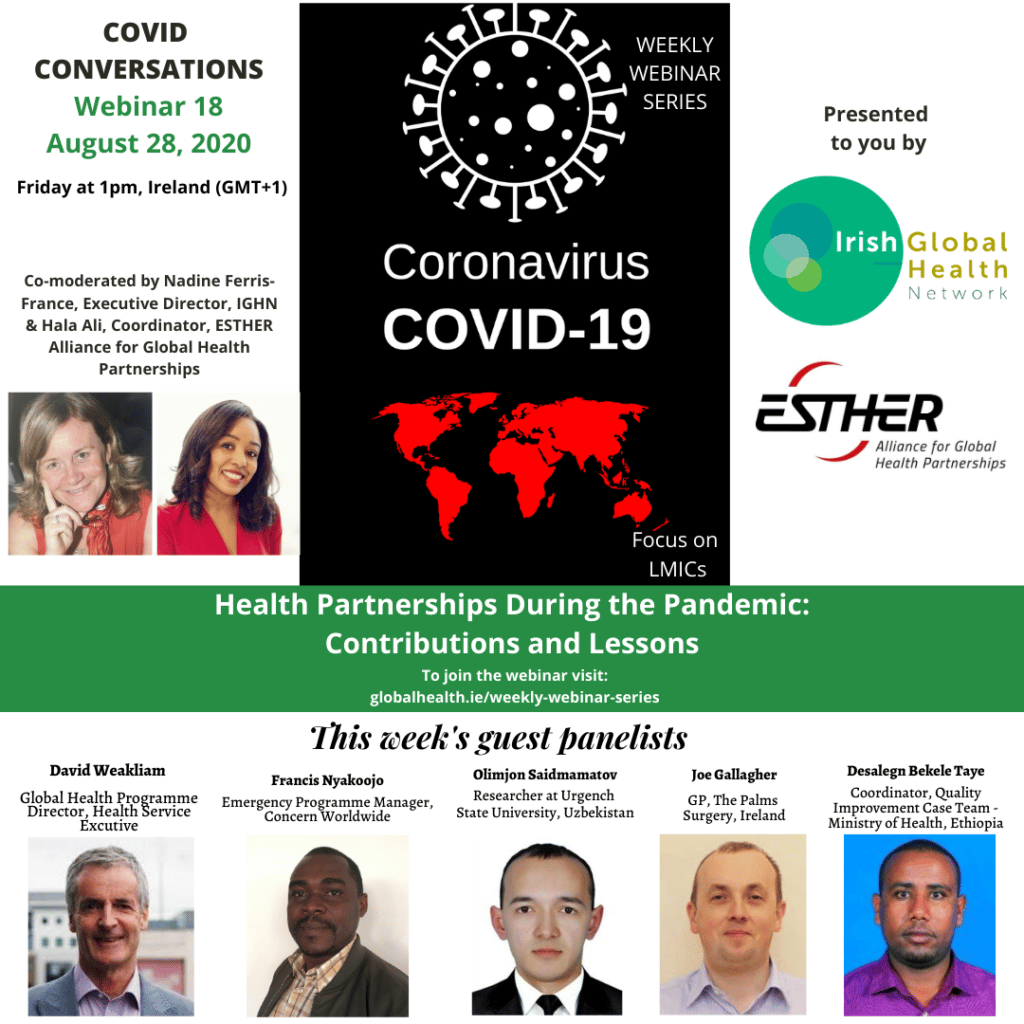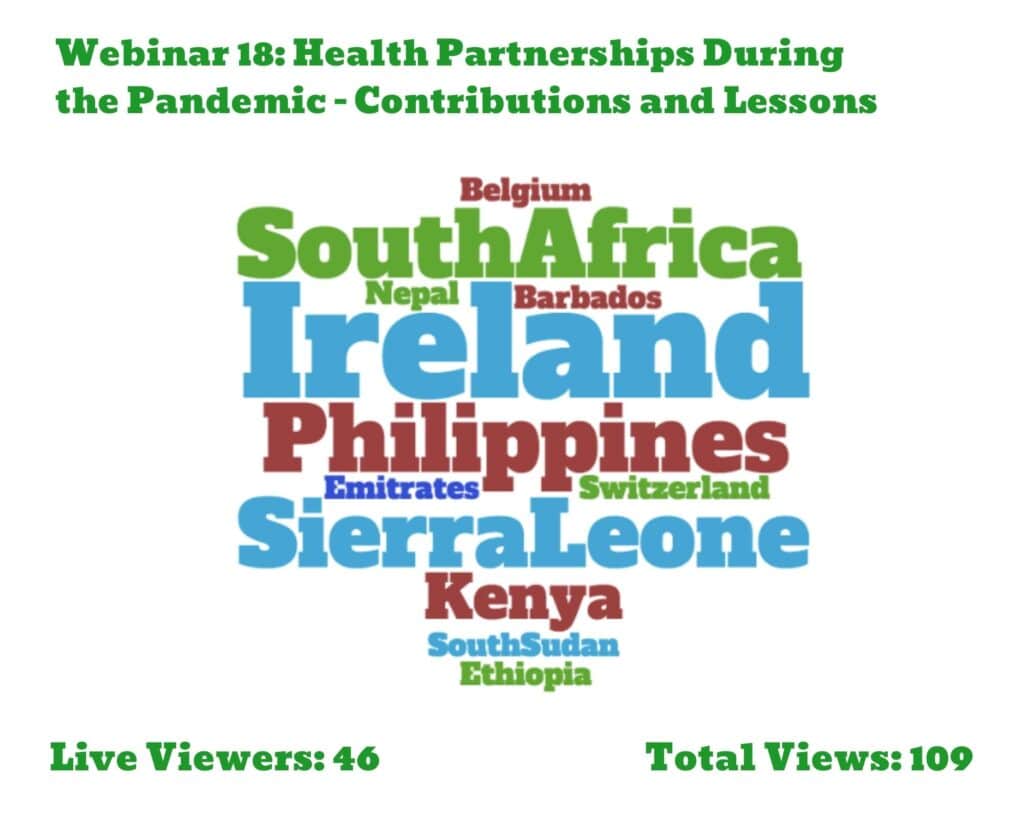Webinar 18: Health Partnerships during the pandemic: Contributions and Lessons
 WEBINAR SERIES: Webinar 18: Health Partnerships during the pandemic: Contributions and Lessons
WEBINAR SERIES: Webinar 18: Health Partnerships during the pandemic: Contributions and Lessons
The full suite of resources shared by speakers is available under each of their individual recordings, along with a summary of the points they made. A full list of additional resources shared by participants and hosts during the webinar can be found at the bottom of the page.
VIEW THE WEBINARYour feedback is important to us so that we can continue to share learnings, insights and practices relevant to those working in the LMIC community. Please take the time to complete our evaluation at the button below so that we can continue to improve the series.
COMPLETE WEBINAR EVALUATIONA SUMMARY OF POINTS MADE
David Weakliam, Global Health Programme Director in the Irish Health Service Executive (HSE). He represents Ireland in the ESTHER Alliance for Global Health Partnerships. He is Adjunct Professor in global health at University College Dublin.
COVID-19 has caused a fundamental disruption to the central health services in LMICs. The virus has impacted upon the access and availability of services, as well as upon programmes to improve hospital care.
Key Learning:
- The strength of the relationship between partners is related to the established trust, respect, mutual understanding and shared commitment towards long-term positive change
- Flexibility – a key feature of partnership is being able to adapt to changes
- New online ways of working can be effective. There has been a good engagement online and more potential of reach through online platforms.
Francis Nyakoojo has been the Emergency Programme Manager with Concern Worldwide for the past 4 years. A medical doctor by training, Francis has over 10 years, practical experience coordinating and managing projects in humanitarian and development context in different countries in Africa. Currently, Francis is coordinating the Concern, GOAL and Trocaire consortium that is working alongside the ministry of health and sanitation to respond to the COVID-19 pandemic in Serra Leone.
Ireland’s three largest humanitarian agencies have teamed up with the Irish government to fight the spread of COVID-19 in Sierra Leone.
Two coordinated programmes was delivered across 11 of Sierra Leone’s 16 districts. The objective was to strengthen resilience and prevent/reduce the transmission of COVID-19 in targeted districts.
Key Learning:
- COVID-19 has provided the opportunity to share resources and staff with different experiences and disciplines for a common goal
- Partnerships were strengthened to support each other in terms of designing tools; monitoring and evaluation; delivering services and providing technical support
Olimjon Saidmamatov is a researcher at Urgench State University, Uzbekistan. He coordinates a partnerships supported by ESTHER Switzerland connecting gynaecology surgeons of Fribourg Cantonal Hospital and Urgench Perinatal Hospital towards introducing spinal anaesthesia practices in laparoscopic surgeries.
The Partnership between the Health Service Executive, Isqua (The International Society for Quality in Health Care) and the Ministry of Health was initiated in 2019 to build capacity of public hospitals in Addis Ababa.
Challenges that were met include implementation of training programmes and maintenance of quality improvement.
Key Learning:
- Online platforms were used to deliver online training and for orientation sessions to medical students and staff.
- When partnerships are created, there needs to be a consideration for challenges that may arise in the future. Thus, partners should work together to find alternative solutions or a ‘plan B’ together.
Joe Gallagher is a GP in The Palms GP Surgery in Gorey, County Wexford. The surgery is involved in a partnership with St John’s Hospital in Malawi, focusing on non-communicable diseases. During the pandemic the partnership has pivoted to COVID-19 with unexpected results. Joe is also a clinical associate professor in the School of Medicine at University College Dublin.
“Ní neart go cur le chéile, mutu umodzi susenza denga”
“There is no strength without working together, one head doesn’t carry the roof”
Key Learning:
- Rapid needs assessment was conducted using emails and online meetings. One of the biggest key gap was education for health-care workers and health-care managers.
- Short relevant videos were developed to fill the gap. This generated 830,000 views in almost every country in Africa
- The pandemic has created more interactions from people across the world
- For Ireland this has: strengthen teamwork; given us a broader focus on COVID-19 and taught us new skills
- More importantly, it reminds us that it is not all about us.
Desalegn Bekele Taye, Coordinator of Quality Improvement case team at the Ministry of Health, Ethiopia. He is Health care quality and safety advocate professional with an MD from Bahir Dar University and he will speaking about the partnership between MoH and HSE and Isqua.
Key Learning:
- Video streaming of surgeries from Uzbekistan was translated to Switzerland to provide for training, and upkeep practices in introducing spinal anaesthesia in laparoscopic surgeries.
Further Resources:

CATEGORIES
- Equity in Action Blog
- Training Programmes
- Sponsorship
- Vaccine Equity
- Get Global – Global Health Talks
- Student Outreach Team
- Get Global Young Professionals Talk Global Health
- Global Health Matters – Live Event Series
- Global Health Matters – IGHN Live Event Series
- An initiative of Irish Global Health Network
- ESTHER Ireland and ESTHER Alliance for Global Health Partnerships
- Global Health Matters – Webinar Series
- ESTHER
- IGHN Conferences
- Global Health Conference 2020
- Women in Global Health – Ireland Chapter
- ESTHER Partnerships
- Weekly Webinar Series
- 4th Global Forum on HRH
- Access to Medicines
- Archive Page Weekly COVID Webinars
- Clean Cooking 2019
- Climate Change and Health Conference 2017
- Conference Abstracts
- Conference Materials
- Covid FAQ
- COVID Funding Opportunities
- COVID-19
- COVID-19: Gender Resources
- Dashboard and online resources
- Education
- ESTHER Alliance
- Events
- Events & News
- Funding covid
- Global Health Exchange 2018
- Global Health Exchange 2019
- Global Health symposium 2019
- Health Workforce/HRH
- Homepage Featured
- Homepage recent posts
- IFGH 2011-2012 Conference and Events
- IFGH 2014 Conference
- IFGH Multimedia
- Irish AIDS Day 2017
- Irish News and Feeds
- Key Correspondent Articles
- Key Correspondent News
- Maternal Health
- Multimedia
- News
- News & Events
- Newsletter
- Opportunity
- Our LMIC's Resources for COVID19
- Partner Country News and Feeds
- Past Events
- Policy
- Presentations
- Recurring events
- Reports & Publications
- Research
- Resources
- Student Outreach Group
- Students Corner
- TEDTalks
- TRAINING COURSES FOR HEALTH CARE PROFESSIONALS
- Uncategorized
- Upcoming Events
RECENT POSTS

Imagine a world without nurses

Making Therapy Accessible: Reimagining Mental Health Through Traditional Healing and Language by Talha AlAli

Decolonisation as a framework for Youth Partnership in Global Health by Arwa Hany Sharaby

“Fight the bullies!”

SOT Pre-Conference Event 2025

